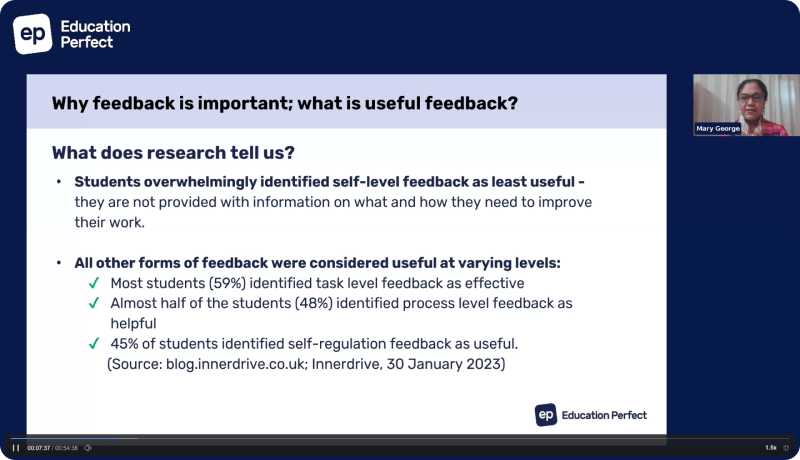Why Feedback Matters

The art of providing effective feedback
As teachers, one of the greatest challenges we face is providing effective feedback that not only improves student outcomes but maintains their enthusiasm and desire to learn. This is often compounded by a lack of time, the requirement to provide tangible assessment grades, and the diversity of student needs.
What is feedback?
Understanding what we mean by feedback is an important starting point. John Hattie’s research has revealed that feedback is one of the most essential aspects of a teacher’s job, and yet defining that from a student’s perspective was substantially different from a teacher’s understanding of feedback. According to Hattie, after interviewing thousands of students, what they wanted to know was simple: ‘Help me to know what to do now.’ This clarity is a keystone of the art of providing effective feedback.
Goal orientated
From a student’s perspective, their entire education journey can be broken down into small steps, each defined by an individual goal. The cyclical nature of instruction means that they build on previous knowledge and that each task is linked to a goal. Therefore, when providing feedback, teachers must be mindful of what goal the student is seeking to achieve, and what questions they can ask to elucidate insight from their students.
Specific and clear
Feedback needs to be specific in order for it to be useful. Simply writing on a student’s paper that the material is ‘unclear’ or ‘lacks emphasis’ does not provide them with a clear next step. Identifying what parts of the paper do not meet the required standard to achieve the goal is one aspect of feedback, but the other is providing them with specific questions to consider and ways that they can change their work in order to achieve the goal.
Different sources
It’s easy to become overwhelmed when considering providing this level of detail to a whole class, or even multiple classes. It’s important to remember that feedback can take many forms, and can come from different sources. That conversation you had with a student while circulating throughout the classroom was feedback, so was the comment that was placed on their work, and so too was the self-assessment that they completed after writing their first draft. Many teachers often use peer feedback effectively, and if structured appropriately, it can be tremendously powerful. One way of achieving this is by providing students with a scaffolded form that has good open feedback questions linked to the task, they can then ‘see three before me’ and gain a first round of feedback before talking to their teacher.
Goals and feedback
We are quite familiar with the components of a good goal: that it be specific, measurable, achievable, realistic, and time-bound. The same principles can be said to apply to feedback. However, there is one further aspect to include, and that is the personal nature and effect of feedback on a student. Strong relationships will always make them more receptive to hearing feedback, and highlighting the good aspects of the work has a tremendous positive cognitive impact.
Top five suggestions for providing feedback
Be mindful of the difference between feedback and feed-forward: the former is related to their current progress, and how they are currently doing, whereas feed-forward provides the next steps, and the refinement of goals to attain the next level of achievement.
Use technology wisely: provide general feedback for a class via a video clip on a virtual classroom, record spoken comments on students’ work rather than writing long comments, or create rubrics that work for sections of tasks and provide clear next steps.
Create a safe environment: Feedback is at its most effective when students feel safe, when they see the value in making mistakes, and when they are inspired to engage in learning.
Cultural context matters: Consider whether your students operate from an individualist’s perspective or a collectivist culture. This will have a significant impact on how they receive feedback, and whether group or individual feedback is most effective.
Diversify who provides feedback: Classmates, students from other classes, external mentors, teachers, and parents are all capable of providing good feedback. Create a culture where different perspectives are valued, this will encourage your students to think about what makes good feedback. They will enjoy sharing this knowledge.
There’s one final way to discover if your feedback is effective: ask your students. In creating a collaborative and safe environment, teachers can actively model the vulnerability of being open to feedback. It’s often a good reminder of how this can be challenging and can be eye-opening in terms of how your feedback is received. Have your comments helped students to learn? Do some students find specific methods of feedback more useful than others? Not only will this provide students with a way to tell you what they do and don’t like, but it will also provide teachers with valuable information for differentiating their feedback practice.




